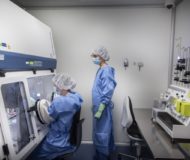

The Sant Pau Research Institute (IR Sant Pau) and the Blood and Tissue Bank (BST) have signed a collaboration agreement aimed at promoting the development and production of innovative drugs.
The agreement, which represents a pioneering alliance between two leading institutions in the health field, establishes the basis for the creation of a joint node that will have facilities prepared for the production of advanced therapies, including CAR-T cells.
Within the framework of this agreement, the IR Sant Pau undertakes to involve the Blood and Tissue Bank in the production of its CAR-T cells in clinical trials, consolidating them as an alternative facility for these advanced therapies.
The signing of this agreement represents a fundamental step towards achieving common goals in research and the development of cutting-edge therapies. With this collaboration, the technical knowledge of the BST is merged with the research expertise of the Sant Pau Institute, enhancing innovation capacity in the field of advanced therapies.
One of the main functions of the Blood and Tissue Bank is to provide research teams worldwide with professional expertise and manufacturing capacity for advanced therapy medicines, leveraging the knowledge granted by unique facilities in the country, with 10 white rooms and a leading track record in technological advancements dedicated to serving this type of therapy for over 15 years.
The BST headquarters has the laboratory, equipment, and necessary technology, especially cryopreservation tanks, to maintain these advanced therapy medicines, and above all, experts trained to handle these products. A network model of expertise that has been a pioneer in implementing innovative cancer therapies across the entire public hospital network.
Dr. Jordi Surrallés, director of the IR Sant Pau, highlighted the importance of this alliance: “This agreement represents a unique opportunity to advance in the field of personalized medicine and advanced therapies. We are convinced that, together, we will achieve important milestones to promote research and improve the health and well-being of patients.”
On their part, the CEO of the Blood and Tissue Bank, Anna Millan Álvarez, emphasizes that the signed agreement is the consolidation of a collaborative relationship between both institutions that has been going on for many years, and thanks to which “we have achieved milestones in the field of research that help position the Catalan ecosystem of health innovation at the forefront.”
She added that, “alliances like the ones we maintain with the Sant Pau Research Institute, help us as a country to continue acting as a driver of advanced therapies beyond the Catalan scope and to work towards providing new solutions with medicine based on cellular therapy, which brings hope to many patients for whom there were previously no effective treatments, such as certain types of cancers.”
The work teams of both institutions have already begun to coordinate to launch the first projects that will mark a before and after in the field of advanced therapies.
A new stage of collaboration
The Sant Pau Research Institute and the Blood and Tissue Bank previously signed an agreement to launch the Sant Pau White Room. The agreement served as a framework to design procedures and accredit it for the manufacturing of drugs in advanced therapies.
The Sant Pau White Room has the certification of compliance with Good Manufacturing Practices for Advanced Therapy Medicinal Products, issued by the Spanish Agency of Medicines and Medical Devices (AEMPS), initially obtained in 2020 and renewed in 2022, doubling its production capacity.
“Now we begin a new stage of collaboration with the Blood and Tissue Bank to position both institutions for the future production of advanced drugs expanding horizons beyond research, in order to reach all patients in need,” adds Dr. Surrallés.
The Sant Pau Research Institute has developed two academic CAR-T drugs so far: HSP-CAR30 and HSP-CAR19M. In 2020, the first trial began with a CAR-T immunotherapy drug, pioneering in Europe, for the treatment of classical Hodgkin lymphoma and CD30+ relapsed or refractory non-Hodgkin T lymphoma, in collaboration with the Josep Carreras Foundation against Leukemia and the Josep Carreras Leukemia Research Institute. This drug is currently in phase II of research and constitutes the first CAR-T30 immunotherapy drug (academic), completely produced at Sant Pau, attracting patients from various countries such as Italy, Austria, Poland, Russia, among others.
On the other hand, a clinical trial is currently underway with its second academic advanced therapy drug, produced and developed entirely at Sant Pau, the HSP-CAR19M. This drug is characterized by being enriched in memory T lymphocytes, more long-lasting, with the aim of being more effective against the disease and is being administered to patients with the most common types of B-cell lymphoma (diffuse large B-cell lymphoma, follicular lymphoma, mantle cell lymphoma) who have not responded to other treatments.
The clinical trial, promoted, coordinated, and directed from Barcelona by Dr. Javier Briones, director of the Cellular Immunotherapy and Gene Therapy Research Group at the IR-Sant Pau and head of the Clinical Hematology Unit of the Hematology Service at the Hospital de Sant Pau, collaborates with the Hematology Service of the Virgen del Rocío Hospital in Seville, within the Advanced Therapies Network, one of the Cooperative Research Networks Oriented to Health Outcomes (RICORS) promoted by the Carlos III Health Institute (ISCIII).
In this project, which has received a grant of 2 million euros from the “la Caixa” Foundation, the ISCIII, the Josep Carreras Leukemia Research Institute, and the Blood and Tissue Bank of Catalonia also collaborate.
Sant Pau, which is part of the European project T2Evolve, is one of the accredited centers in the country authorized to use CAR-T drugs, by the General Directorate of Basic Portfolio of Services of the National Health System and Pharmacy, which depends on the Ministry of Health. This center has top-notch facilities, as well as highly qualified and specialized professionals, which allows the development of unique CAR-T immunotherapy projects in Europe.